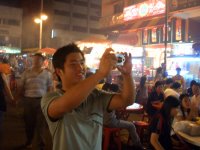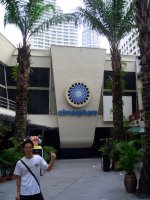I love my job
1) American McGee. That really is his name. American, probably the most famous name there, having developed "Alice". Before that he worked for John Carmack (they were neighbours!!!) , of idSoft, famous for the Doom series.
2) Matt Costello. Writer of Doom 3. He wrote the script and story of the game, but most famous for writing 7th Guest.
3) Mark Meadows. Worked at Xerox-Parc, Stanford Research Institute, Lucasfilm...
4) Xin Chung. The Lord of the Rings game for Xbox was outsourced to his company.
5) Noah Falstein. One of the first few employees in LucasArts.
6) Katie Salen. Designer and academic at Parsons School of Design, New York.
7) Tracey Fullerton. Worked for Microsoft and Sony, now Director of EA Innovation Lab at University of Southern California.
Listening to these guys was really inspiring, not only for what they had done before, and the kind of projects they are currently working on, but because of the passion that they had for their work. I was particularly inspired by:
1) American McGee and Xin Chung. These guys look like they are in their early 30's. They look like regular dudes, in their T-shirt, jeans and tattoos, and you wouldn't be able to tell that they are running highly successful companies. And I'm pretty sure they are having a good time at it.
2) Katie Salen. She researches on the social impact of games, and creates experimental games that mix the virtual world and real life (mixed reality games). What she talked about reminded me again of why I know what I'm doing is right - in the past, games were a way of social interaction, but computer and video games made it anti-social, but now technology has made social interaction through gaming possible again. In my opinion, games will slowly but surely be seen in the positive light again.
3) Mark Meadows. This guy is basically quite a genius. He calls himself a painter - he says his full time job is travelling the world painting and photographing people. Oh, but in his free time he does research on Artificial Intelligence, Natural Language Processing and interactivity in games, and has written a couple of books on those subjects too.
I had a fun time talking to them, getting them to comment on my games, and also got to meet all the people in our local games industry. Its still a small community, but MDA is trying hard to push it, and I am glad to be part of it, doing what I like to do, and hopefully be able to make lots of money from it.











